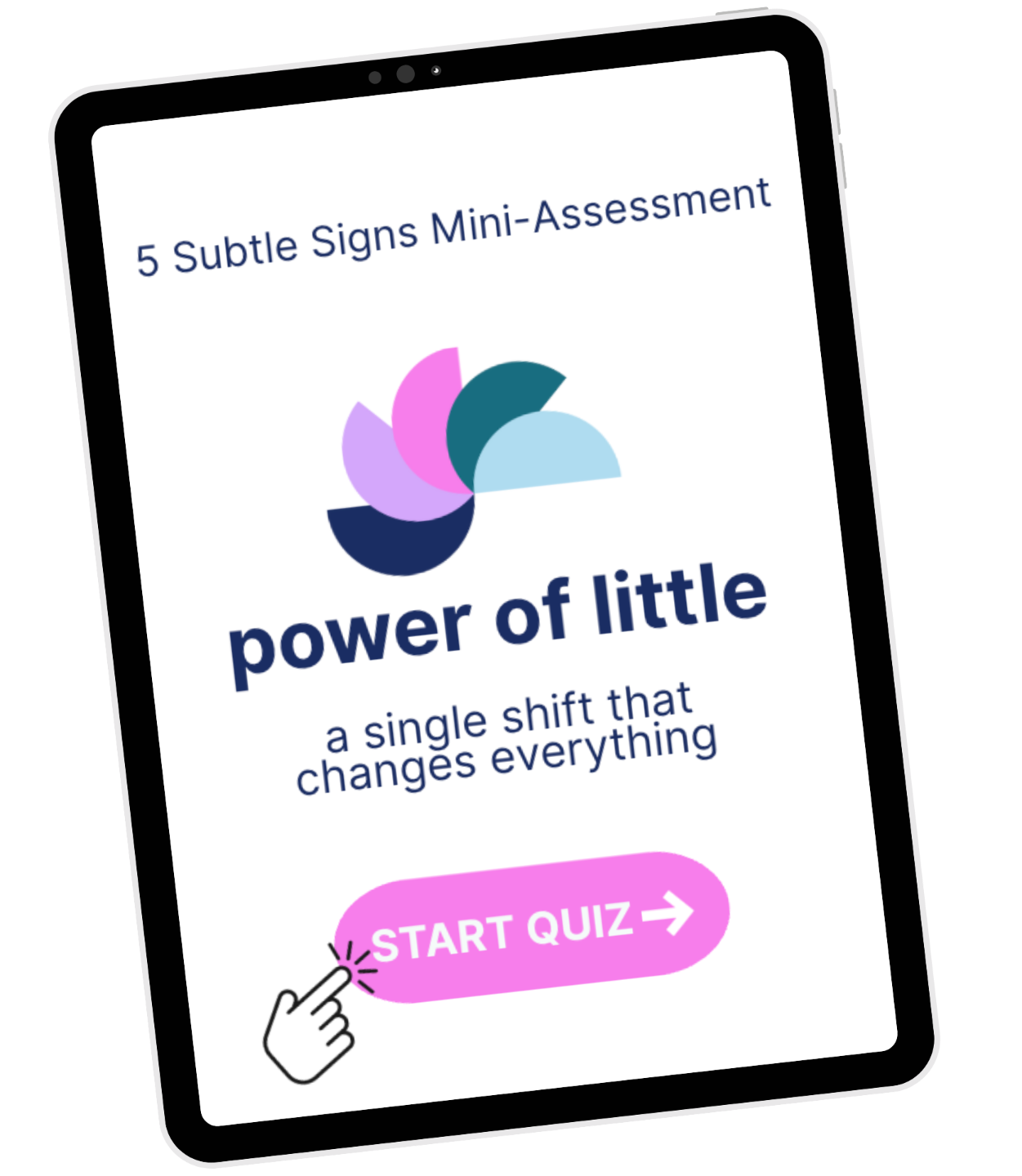Menopause and the Hidden Divorce Crisis: Why 70% of Marriages Could Be Saved
Jul 14, 2025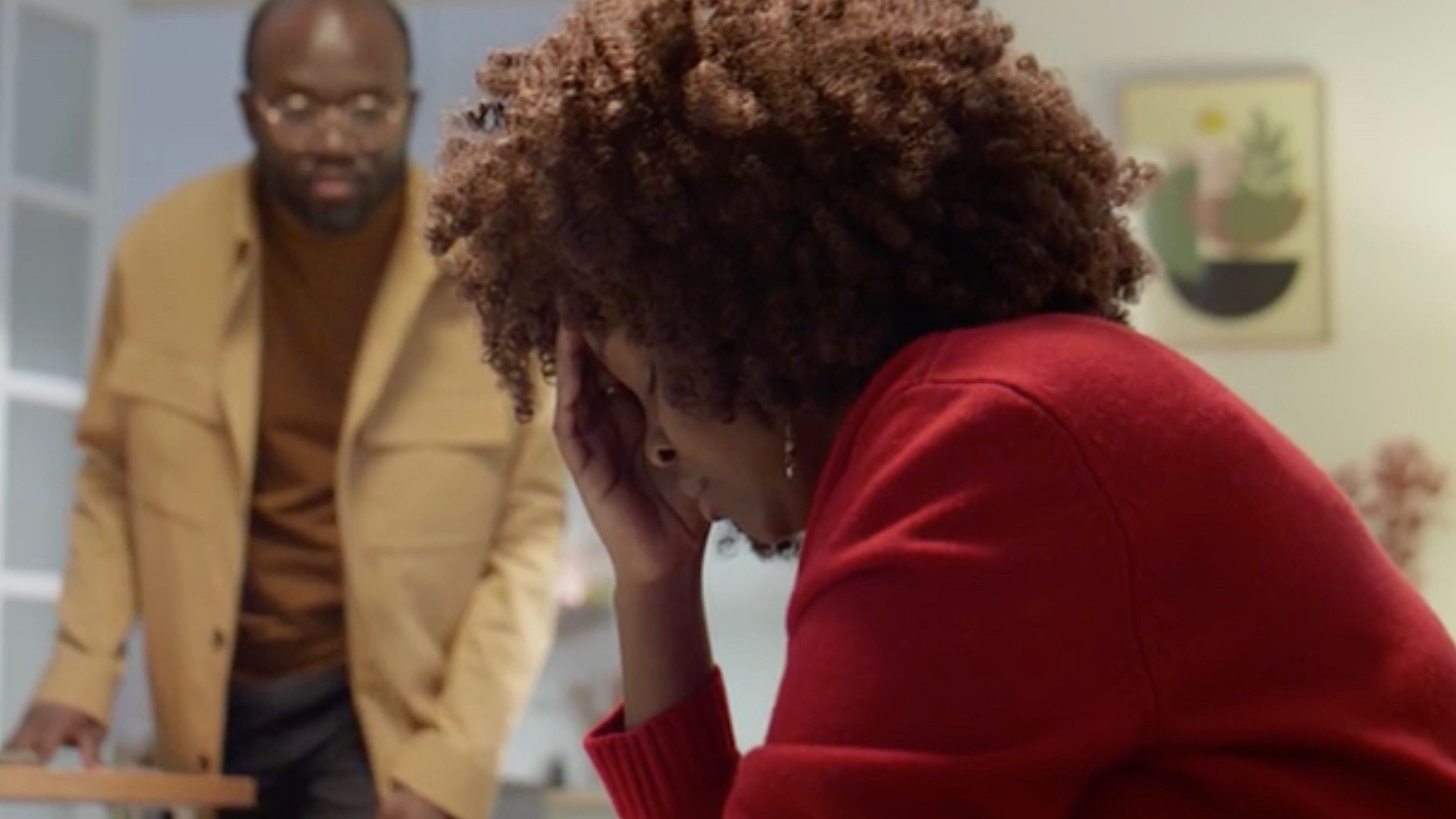
Part 3 of 5: The Menopause Crisis America Ignores
You love your partner. You've built a life together, weathered storms, celebrated victories, created memories that span decades. But lately, everything feels harder. The irritability that comes from nowhere, leaving you snapping at someone you adore over things that wouldn't have bothered you six months ago. The exhaustion that makes intimacy feel impossible, not because desire has died, but because your body feels foreign even to yourself. The brain fog that makes you feel like a stranger in your own life, struggling to connect not just with work or friends, but with the person who knows you best.
Maybe you've had the fight about the temperature in the house one too many times—you burning up while they're comfortable, both of you frustrated by this new source of domestic tension. Maybe you've canceled date nights because unpredictable symptoms make planning feel impossible. Maybe you've wondered if your partner still finds you attractive when hot flashes interrupt intimate moments, or if they're growing tired of the mood swings that seem to emerge without warning.
If your relationships feel strained during this transition, you're not alone. What you're experiencing is part of a relationship crisis that's quietly devastated millions of marriages and families—a crisis with statistics so stark they demand attention, yet somehow remain largely invisible in conversations about menopause and midlife.
The Numbers That Break Hearts: The Hidden Divorce Crisis
Here's a statistic that should give us all pause: 68% of divorces involving women in their 40s, 50s, and 60s are initiated by wives during their menopausal years¹. Let that sink in for a moment. More than two-thirds of marriages ending during these crucial decades are ended by women navigating the hormonal upheaval of perimenopause and menopause.
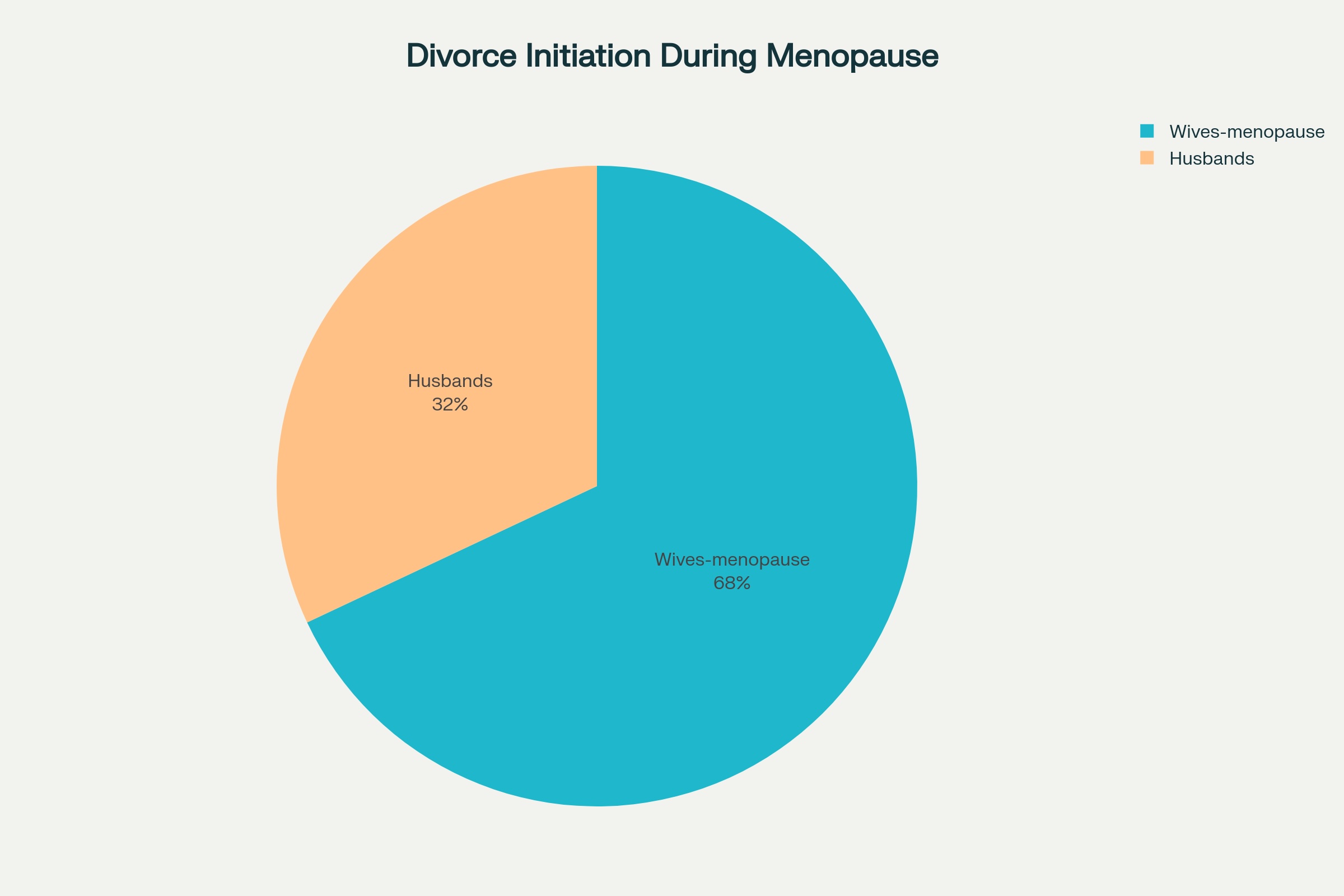
Divorce Initiation Rates During Menopause - showing that 68% of midlife divorces are initiated by wives experiencing menopausal symptoms
The Family Law Menopause Project found that 73% of women blamed menopause for their divorce, with symptoms increasing domestic arguments and stress in 67% of cases². These aren't simply statistics about "normal" marriage challenges or empty nest syndrome—these are the documented effects of untreated menopause symptoms on relationships that might otherwise have survived and thrived.
Perhaps most heartbreaking of all: 70% of women reported that proper treatment could have saved their relationships³. Seventy percent. That means hundreds of thousands of marriages ended not because love died, but because symptoms went untreated and support was unavailable.
Think about that for a moment. Relationships that weathered career changes, financial stress, parenting challenges, and decades of life's ordinary ups and downs—crumbling under the weight of untreated hormonal symptoms that could have been addressed with proper medical care.
When Your Body Changes Your Relationships: The Biological Reality
Let's talk honestly about what menopause does to relationships, because understanding the biological basis of these changes can be the first step toward addressing them with compassion rather than blame. The same hormonal fluctuations affecting your cognitive function and workplace performance are also dramatically impacting your capacity for emotional connection and physical intimacy.
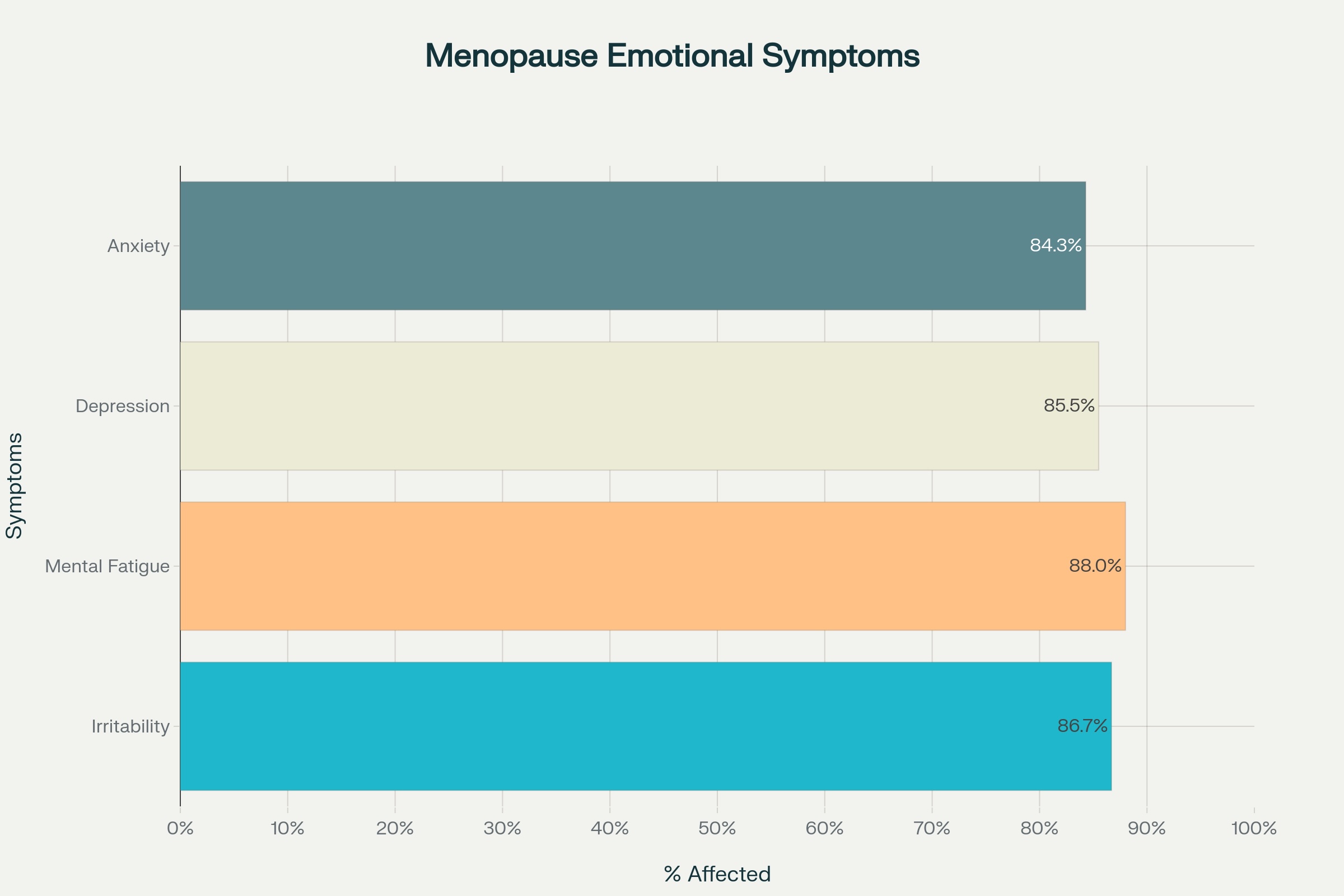
The Intimacy Crisis:
- Physical changes during menopause can make intimacy uncomfortable or painful for many women⁴
- Decreased libido affects desire and connection with partners
- Hot flashes and night sweats disrupt shared intimate moments and sleep
- 50% of women worry that lack of physical intimacy will end their relationship⁵
- Vaginal dryness and other physical symptoms create barriers to spontaneous affection
The Communication Breakdown:
- Brain fog makes complex emotional conversations more difficult to navigate
- Irritability can turn minor disagreements into major conflicts that feel disproportionate to their triggers
- Mood swings create unpredictability that partners struggle to understand and respond to
- 76% of women feel their partners lack knowledge to support them effectively through this transition⁶
The Emotional Distance:
- Depression and anxiety affect the ability to connect emotionally and maintain relationship intimacy
- Exhaustion from poor sleep makes quality time together feel impossible rather than rejuvenating
- Identity changes during menopause can create feelings of disconnection from established relationship patterns
- 65% of women report negative effects on their romantic relationships during this transition⁷
The Family Ripple Effect: Beyond Marriage
The impact of untreated menopause symptoms extends far beyond marriages. Research indicates that 80% of women report that perimenopause and menopause symptoms create stress for children and family life⁸. The combination of mood changes, irritability, sleep disturbances, and cognitive issues creates household instability that affects all family members.
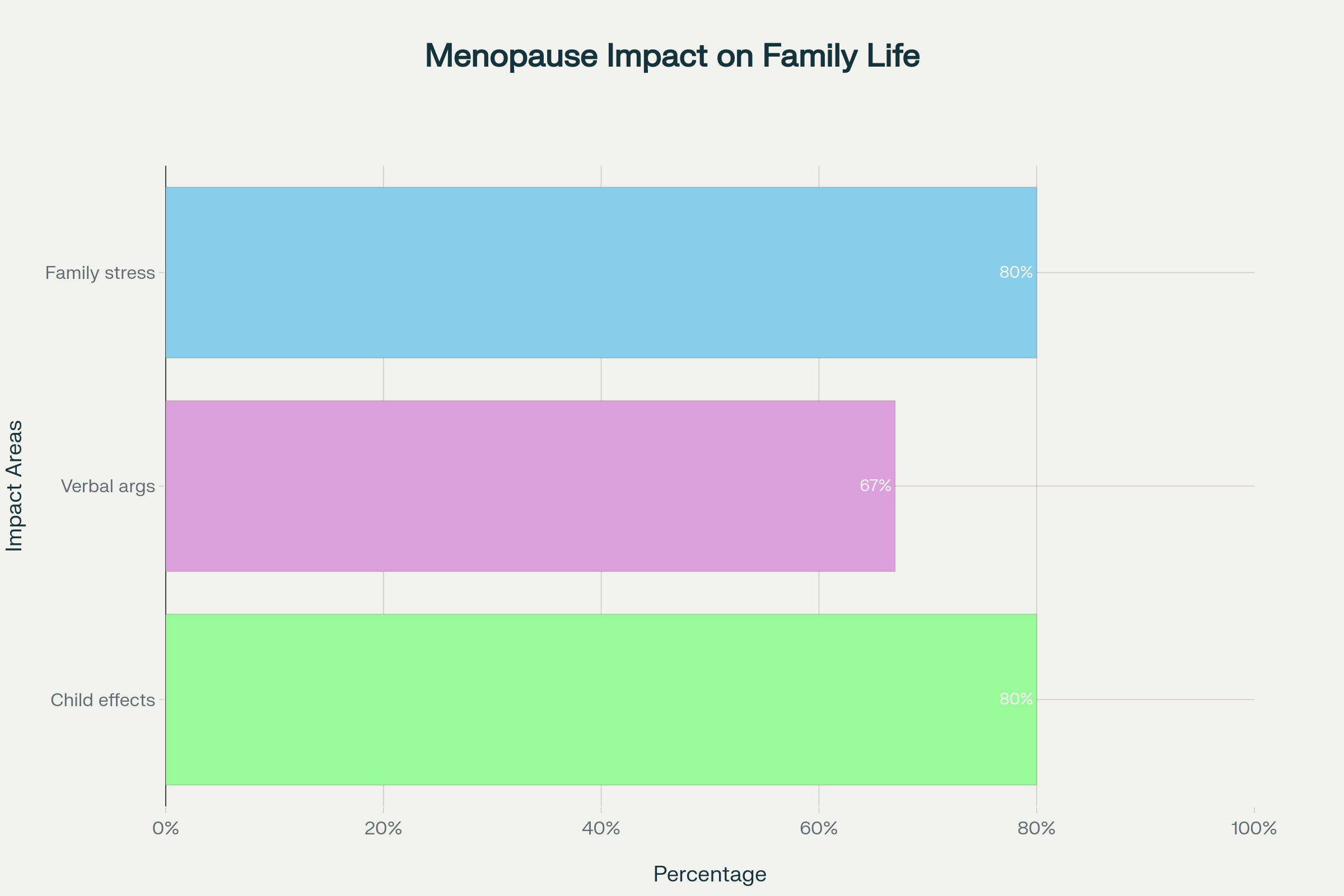
Impact on Children and Family Dynamics:
- Teenagers who suddenly feel like they can't approach a mother who's always been their safe harbor
- Young adult children who feel guilty for adding any stress to a household that already feels fragile
- Family dinners that end in tears over nothing, leaving everyone confused and walking on eggshells
- Holiday gatherings or family vacations shadowed by unpredictable mood swings that no one understands
The Guilt and Shame Cycle: Many women describe feeling like they're watching themselves behave in ways that don't reflect who they really are—snapping at children they adore, feeling disconnected from partners they love, struggling to show up emotionally for family members who depend on them. This creates a cycle of guilt and shame that compounds the relationship strain.
The Silence That Hurts: Perhaps most damaging is the silence around what's happening. Family members often don't understand that Mom's irritability or emotional distance has a biological cause. They may interpret mood changes as personal rejection or assume they've done something wrong.
The Partner Perspective: Lost in Translation
For partners watching someone they love navigate menopause, the experience can feel bewildering and heartbreaking. The person they married may seem to disappear behind symptoms that no one adequately explained or prepared them for. Many partners report feeling:
- Confused by personality changes that seem to come from nowhere—the patient, loving person they know becoming irritable or emotionally distant
- Rejected by decreased physical intimacy without understanding that libido changes are biological, not personal
- Helpless in the face of symptoms they don't understand and can't fix
- Frustrated by feeling like they're "walking on eggshells" without knowing what might trigger mood changes
- Guilty for feeling resentful about changes their partner can't control
- Lonely within the relationship as emotional and physical connection becomes unpredictable
The tragedy is that much of this confusion and pain could be prevented with education and support. When partners understand that irritability, mood swings, decreased libido, and emotional changes are symptoms of a medical transition rather than personal rejection or relationship failure, they're often much more equipped to provide patient, loving support.
When Love Isn't Enough: The Treatment Gap Reality
Here's perhaps the most crucial point about relationships and menopause: love alone cannot overcome the biological reality of untreated hormonal symptoms. Relationships that might easily weather other challenges—job loss, family illness, financial stress, even infidelity—can crumble under the sustained pressure of menopause symptoms that affect mood, sleep, cognitive function, and physical intimacy.
This is why the treatment gap matters so deeply for relationship stability. When only 21% of women experiencing menopause symptoms receive adequate treatment, we're essentially asking millions of couples to navigate a major life transition without the medical support that could make the journey manageable.
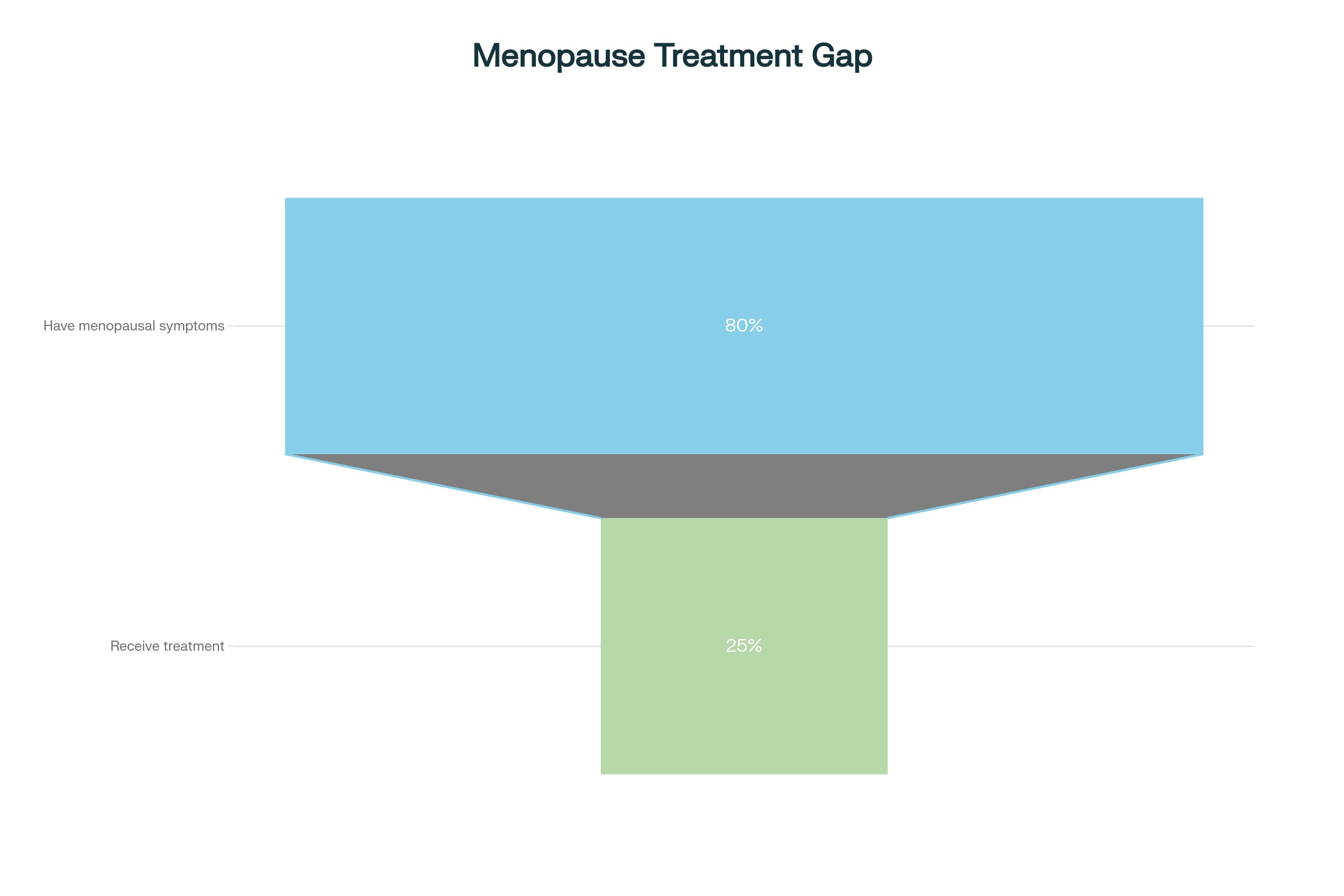
What Proper Treatment Can Restore: The research shows that effective menopause treatment can dramatically improve relationship outcomes by addressing the biological roots of relationship strain⁹:
- Mood stability and emotional regulation that allows for more consistent, loving interactions
- Improved sleep quality leading to better stress management and emotional availability
- Restored cognitive function that improves communication and emotional processing
- Relief from physical symptoms that affect intimacy and daily comfort
- Overall quality of life improvements that benefit both partners and the entire family
The Power of Understanding: Small Steps Toward Connection
The Power of Little approach to relationship challenges during menopause recognizes that not every marriage can or should be saved, but that many relationships fail unnecessarily due to lack of understanding, treatment, and support. Sometimes the gentlest first step is simply naming what's happening.
Start with Education Together: Sometimes the most powerful step is learning together about what's happening biologically. When both partners understand that mood changes, decreased libido, and cognitive shifts are symptoms of a medical transition, it becomes easier to respond with compassion rather than blame.
Communicate About the Physical: It can feel vulnerable to discuss how your body is changing, but many partners report feeling relieved to understand that decreased interest in intimacy isn't about lack of attraction or love. Honest conversations about physical changes can actually deepen intimacy even when sexual frequency changes.
Explore Treatment Options as a Team: Attending medical appointments together, researching treatment options, and celebrating small improvements can become acts of partnership rather than individual struggle. This collaborative approach often strengthens relationships even through difficult transitions.
Adjust Expectations Temporarily: This doesn't mean accepting a permanently diminished relationship, but rather recognizing that some adjustments during treatment and transition can preserve the foundation for future intimacy and connection.
Practice Relationship Self-Compassion: Just as you're learning to be gentle with yourself during this transition, extending that same compassion to your relationship can prevent small challenges from becoming relationship-ending crises.
The Hope in Professional Support
Couples therapy with menopause-informed therapists can provide invaluable tools for navigating this transition while maintaining connection¹⁰. These professionals understand how hormonal changes affect relationships and can help couples:
- Develop communication strategies that account for cognitive and emotional changes
- Create intimacy practices that work with rather than against physical symptoms
- Build patience and understanding for the temporary nature of many symptoms
- Strengthen the relationship foundation while managing transition challenges
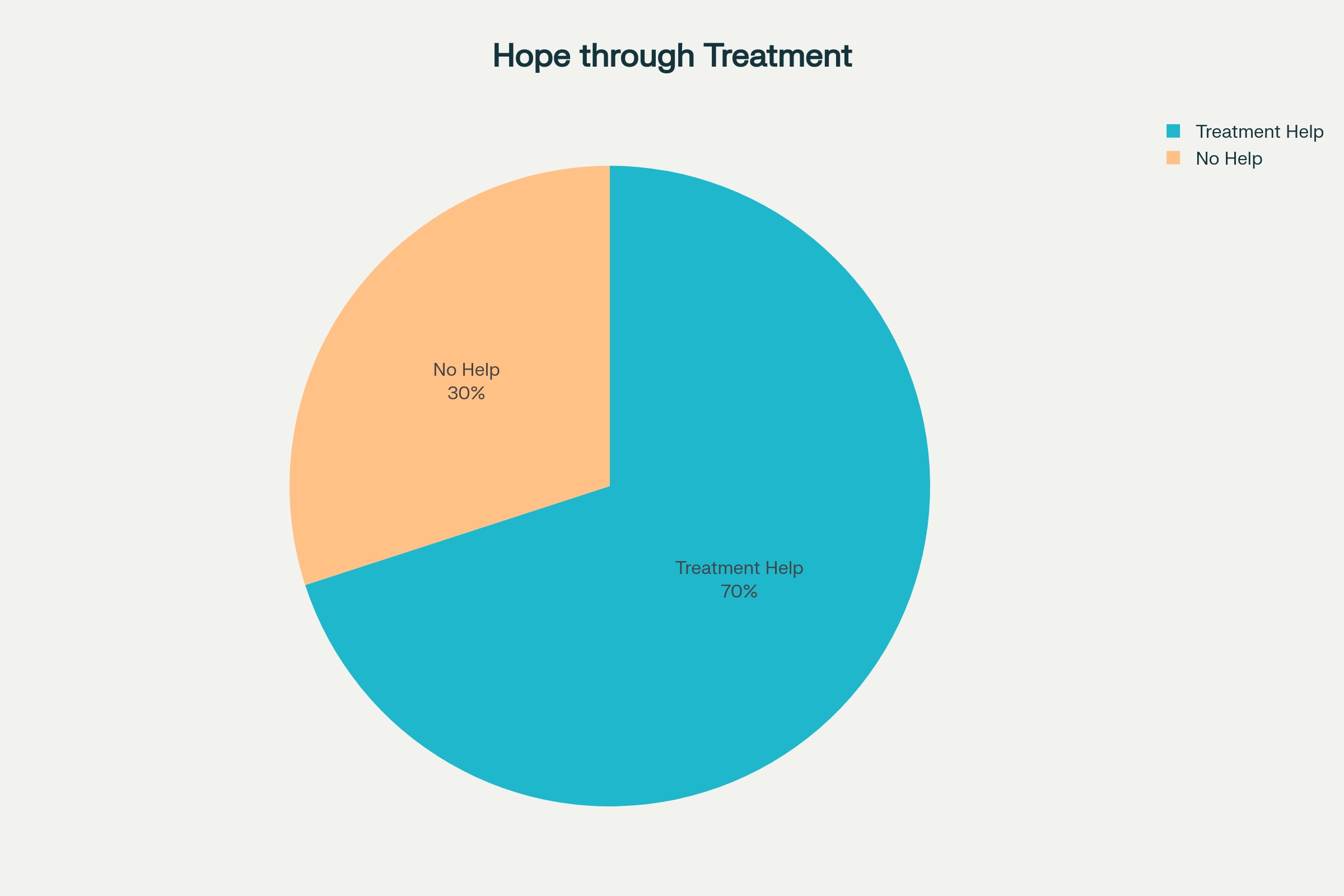
Hope Through Treatment - showing that 70% of women believe proper menopause treatment could have saved their marriages
Many couples report that working with knowledgeable therapists during this transition actually strengthened their relationship by improving communication skills and deepening their understanding of each other's needs¹¹.
The Unexpected Gift: Relationships That Emerge Stronger
While the divorce statistics are sobering, there's also reason for hope. Research shows that couples who successfully navigate menopause together often report stronger relationships afterward. They've developed deeper communication skills, proven their ability to weather significant life transitions as a team, and often discover new forms of intimacy and connection.
Many women also report that menopause, despite its challenges, ultimately led to:
- Greater self-awareness and more authentic communication about needs and boundaries
- Relationships based on deeper compatibility rather than just convenience or habit
- Increased appreciation for partners who provided support during difficult transitions
- Renewed intimacy once symptoms are treated and physical comfort is restored
- Stronger family bonds built through weathering challenges together
Supporting Your Family Through the Transition
If you have children or extended family affected by your menopause journey, small steps toward education and communication can make a significant difference:
Age-Appropriate Education: Helping children understand that Mom is going through a biological transition (similar to how they learned about puberty) can reduce their anxiety and self-blame when you're having difficult days.
Family Support Strategies: Creating family plans for managing challenging days—whether that's ordering takeout when you're exhausted or having Dad handle homework help when you're dealing with brain fog—can reduce household stress.
Open Communication: Simple statements like "I'm having a hard day with my health, but it's not about anything you did" can prevent children from internalizing your symptoms as personal rejection.
Building Support Networks: Connecting with other families navigating similar transitions can provide both practical strategies and emotional support for the whole family.
July 17th: A Date That Could Move the Needle
In three days, an expert panel at the FDA will discuss removing barriers to menopause treatment that could dramatically improve access to effective care. This isn't just about individual women's health—it's about family stability, relationship preservation, and preventing the unnecessary heartbreak of marriages that could thrive with proper medical support.
When women can access effective, stigma-free treatment for menopause symptoms, relationship outcomes improve dramatically. The 70% of women who believe proper treatment could have saved their marriages represent hundreds of thousands of families whose outcomes might be different with better healthcare access.
The changes being discussed on July 17th could:
- Reduce stigma around menopause treatment, making both women and healthcare providers more comfortable discussing options
- Improve access to treatments that address relationship-affecting symptoms
- Increase awareness among healthcare providers about the relationship impacts of untreated menopause
- Set precedent for evidence-based policy making that prioritizes women's health and family stability
For Those in the Storm: You're Not Broken
If your relationships feel strained right now, please remember that what you're experiencing isn't moral failure or relationship incompetence. You're navigating a significant biological transition that affects every aspect of your emotional and physical life.
The irritability isn't who you really are. The decreased intimacy doesn't reflect your feelings for your partner. The mood swings don't define your capacity for love and connection. The exhaustion that makes quality time feel impossible doesn't mean you don't value your relationships.
These are symptoms of a treatable medical condition, not permanent changes in your character or relationship capacity.
Your relationships have weathered challenges before. With understanding, patience, and possibly medical support, they can weather this transition too. The love that brought you together doesn't disappear because of hormonal fluctuations—it may just need different expression and support during this temporary but significant life passage.
Tomorrow's Light: The Science of Recovery
Tomorrow, we'll explore the science of reclaiming your mental clarity and emotional stability. We'll discuss the research that shows how proper treatment can restore not just your cognitive function, but your sense of yourself as someone capable of thriving in relationships, work, and life.
We'll examine the evidence-based treatments that can address the biological roots of the challenges we've been discussing—the brain fog affecting your work, the mood changes straining your relationships, the physical symptoms disrupting your daily life.
But for today, if your relationships feel hard, please be gentle with yourself and those you love. Sometimes the most powerful step is simply recognizing that what you're all experiencing has a name, a cause, and potential solutions.
The Strength in Your Struggle
You're not just enduring this transition—you're actively working to maintain love and connection while your body and brain navigate significant biological changes. That requires tremendous strength, patience, and resilience.
Your relationships matter. Your family's stability matters. The love you've built over years or decades has value that transcends temporary hormonal turbulence.
And on July 17th, there's an opportunity to support changes that could prevent countless unnecessary divorces and family disruptions in the future. Your voice, your story, your simple act of advocating for better menopause care could help preserve families and strengthen relationships for millions of women.
The strain you're experiencing doesn't mean your love is insufficient—it highlights the urgent need for better support, understanding, and treatment. And that change starts with women like you sharing their stories and demanding better care for this crucial life transition.
Tomorrow, we'll turn toward hope and healing. We'll explore how the fog can lift, how relationships can heal, and how you can reclaim not just your cognitive clarity, but your sense of yourself as someone fully capable of loving and being loved through any season of life.
Navigating relationship challenges during midlife transitions? Find gentle, evidence-based support resources at poweroflittle.com—designed to help you and your loved ones understand and support each other through this journey.
Ready to help protect other families? Learn about the July 17th FDA panel at letstalkmenopause.org/unboxingmenopause and discover how your voice can support changes that strengthen relationships and preserve families. Your experience in navigating relationships during this transition matters.
This post is part of a 5-part series exploring the hidden economic and social costs of inadequate menopause care in America. Tomorrow, we'll explore the science of recovery and the hope that comes with understanding treatment options.
References
- Independent UK. (2022). Menopause divorce link study reveals relationship breakdown during transition. Retrieved from https://www.independent.co.uk/life-style/women/menopause-divorce-link-study-b2204312.html
- Stowe Family Law. (2024). The impact of the menopause on relationships and divorce statistics. Retrieved from https://www.stowefamilylaw.co.uk/stowe-support/the-impact-of-the-menopause-on-relationships/
- Balance Menopause. (2023). Menopause puts final nail in marriage coffin research study. Retrieved from https://www.balance-menopause.com/news/menopause-puts-final-nail-in-marriage-coffin/
- Jean Hailes for Women's Health. (2024). Menopause and relationships: Physical and emotional challenges. Retrieved from https://www.jeanhailes.org.au/health-a-z/menopause/menopause-relationships
- Stowe Family Law. (2023). Menopause: A divorce danger zone research findings. Retrieved from https://www.stowefamilylaw.co.uk/stowe-support/menopause-a-divorce-danger-zone/
- RJS Family Law. (2024). The menopause: Is it affecting your marriage or highlighting existing issues? Retrieved from https://www.rjsfamilylaw.co.uk/blog-news/the-menopause-is-it-affecting-your-marriage-or-is-it-simply-highlighting-existing-issues
- Menopause Solutions. (2024). The silent transition: Shedding light on menopause's impact on family life. Retrieved from https://www.menopausesolutions.org/post/the-silent-transition-shedding-light-on-menopauses-impact-on-family-life
- Centro Médico ABC. (2024). Menopause: Become an empathetic family during transition. Retrieved from https://centromedicoabc.com/en/digital-magazine/menopause-become-an-empathetic-family/
- North American Menopause Society. (2024). Treatment effects on relationship outcomes in menopause. Clinical practice guidelines
- Peachey Counselling. (2024). Menopause and mental health: Therapeutic approaches for couples. Retrieved from https://www.peacheycounselling.ca/blog/2024/menopause-and-mental-health
- Mass General Brigham. (2024). Menopause and mental health: Relationship therapy outcomes. Retrieved from https://www.massgeneralbrigham.org/en/about/newsroom/articles/menopause-and-mental-health
Complete research citations and additional sources available at poweroflittle.com/research
Keywords: menopause relationship problems, perimenopause marriage strain, midlife divorce statistics, menopause family impact, partner menopause support, feeling disconnected relationship, marriage problems menopause, menopause emotional changes, relationship struggles midlife, intimacy problems menopause
Weekly Gentle Support for Your Midlife Journey
Gentle prompts, science-backed tips, and stories of tiny wins — delivered every Friday.
By subscribing, you agree to receive ongoing updates



